If you’ve been trading for crypto, you’ve probably been using centralized exchanges like Binance or Bitfinex. As of now, using a decentralized exchange (DEX) is not the first option for the majority of people, despite fun unicorns and pancakes are as their logos.
Still, 2022 continues to see the rise of decentralized finance as the world inches closer and closer to decentralization.
The key issue with centralized exchanges is that they are governed by a central authority – a company that controls your funds and data just like a traditional bank. Besides, centralized exchanges utilize the order-book model that you would see in traditional stock exchanges, with a list of buy and sell orders.
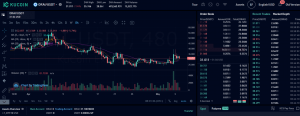
Traditional order-book model used by the exchange Kucoin.
The exchange acts as a custodian, holding assets as a market maker and finding those willing to sell assets to buyers. Asset custody, asset listing, liquidity, headquarters, director board and centralized trade execution are all qualities of a centralized exchange.
Fortunately, these can all be decentralized and that is what decentralized exchanges set out to do: entirely peer-to-peer trading platform’s governed by software and users. On decentralized exchanges, you merely have to connect your wallet, like MetaMask, and you are ready to trade directly from it. This makes trading private and quick, and you don’t have to go through the tedious process of setting up a bank account, and trading account, which infringes on your privacy with intrusive and insecure Know-Your-Customer (KYC) surveys like your identity verification, home address, income, and much more.
In this guide, we’ll review the top decentralized exchanges that exist today. But first, here’s how they came to be.
A Short History of Decentralized Exchanges
The first decentralized exchanges were very slow, with companies like Bisq allowing people to find each other off-chain and making peer-to-peer. transactions. In 2016, EtherDelta began to imagine a more futuristic DEX. The platform used smart contracts to manage trading wallets in the traditional order-book model. This model, however, was not as compatible on Ethereum, lacked liquidity and had a complicated user experience.
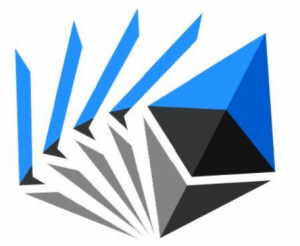
EtherDelta
In 2018, a new generation of decentralized exchanges have come to the fore. They use automated market makers, asset pricing dictated by permissionless protocols and liquidity pools rather than buyers and sellers. Fast forward to 2022, and decentralized exchanges have become immensely popular.
The top 10 decentralized exchanges chosen here were, for the most part, chosen for having the highest market volume, a main objective metric. The only exception is Bisq, which was chosen for the values it brings to decentralization. These exchanges are also organized by market volume from highest to lowest, at the time of writing, with the exception of Bisq. This should give you a good view as to what kind of decentralized exchanges are out there right now and what some of the most used ones bring to the table.
Top 10 Decentralized Exchanges
1. Uniswap

When it first came out in 2018, Uniswap was revolutionary. The fact that you could swap Ethereum-based ERC20 tokens on the Ethereum blockchain without an order book was quite a feat. Instead, Uniswap made use of smart contracts that allow users to trade with each other without intermediaries, making it decentralized and peer-to-peer.
Uniswap used innovative liquidity pools in order to generate the assets needed for swaps to occur. Users, like you, can add in pairs like ETH / DAI coins, for example, in order to add to the pool. In return, users get a small percentage when assets from that pool are used. Pricing is determined by how much of the asset is left in the liquidity pool.
Uniswap’s interface is one of the great things about the platform. You can quickly link Uniswap to your MetaMask and start swapping tokens. It’s simple, effective and, perhaps more importantly for certain crypto enthusiasts, decentralized. Uniswap is still, after all this time, at the cutting edge of decentralized finance.
The overarching goal of Uniswap is to have users, like you, handle the governance of the exchange. This means that users will help the exchange’s future by voting if they have staked any of the Uniswap tokens. As far as decentralized exchanges go, you can’t go wrong with the DEX that brought decentralized exchanges to the forefront. Since then, many exchanges have straight-up copied Uniswap’s model because of its success and open-source code.
Uniswap V3 has also recently been launched, bettering Uniswap’s capital efficiency, execution and infrastructure. The Uniswap protocol keeps evolving, so even though other protocols with a similar interface have come to challenge Uniswap, the Uniswap team has managed to keep their platform fresh for users.
2. MDEX
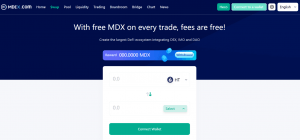
Although gas fees on the Ethereum blockchain will lower soon, MDEX has managed to eclipse Uniswap in market cap volume when you take both MDEX and MDEX (BSC) market cap volumes into account. MDEX is not shy to declare itself already as the largest DeFi ecosystem. For only being in existence since January 2021, with the MDEX (BSC) only coming out in April 2021, MDEX has already become arguably the largest decentralized exchange in the world. Both of their blockchains have over $1 billion in market cap.
MDEX could have been first on this list, as its success in such a short amount of time has been immense, but the nod goes to Uniswap for being so influential and still so relevant in the space. It might make users uneasy that MDEX was created by Huobi, a centralized entity, whereas Uniswap was created as a decentralized entity, with no ICO, from the start.
MDEX’s homepage has the feel of a centralized exchange, with charts and numbers thrown at you. This isn’t a bad thing as it does give the user a dynamic engagement. Perhaps if you’re more comfortable with numbers being shown to you right away, instead of the quiet interface of Uniswap, you would find comfort in it. The swap feature is also as intuitive as Uniswap’s, with options like pool, liquidity and trading at the top.
Overall, MDEX should be on your radar for decentralized exchanges. Its ease of use and what it offers users have generated growth unprecedented for any decentralized exchange.
3. SushiSwap

SushiSwap is first on the list of culinary-themed decentralized exchanges. If you are a fan of sushi over unicorns, this may appeal to your senses more. In any case, SushiSwap has a lot in common with Uniswap since it is a fork of Uniswap.
It didn’t end with just being a cute sushi-themed fork. Controversially, SushiSwap launched ‘Vampire Attack’ onto Uniswap, draining it of its liquidity by offering those who migrated huge rewards and incentives to switch over. In a matter of two weeks, over USD 1 billion worth of cryptocurrency was siphoned out. In another controversy, the anonymous founder also took out USD 14 million, which he regretted and put back in.
Even with all of this, SushiSwap continues to be one of the top decentralized exchanges. The reward distribution, or the interest that stakeholders make when contributing to the liquidity pool is adjusted so that those with smaller holdings also get compensated well, not just those with extremely large stakes. There are also fun sushi-themed rewards.
The swap interface looks much more modern than Uniswap’s, and it is just as easy to trade on it. Just like a copy of Uniswap V2, you can find all the different options at the top, from pools to yields, to analytics. If you ignore the controversies and are interested in the staking rewards, then SushiSwap is a great decentralized exchange to use.
4. BurgerSwap
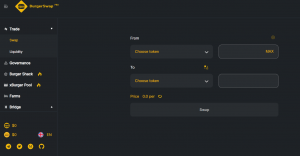
Like Uniswap and its food counterpart in SushiSwap, BurgerSwap also provides swapping and a percentage yield from liquidity pools. What differentiates BurgerSwap are the rewards it gives for participating in governance. This means that if you are an active participant in voting where the protocol will head towards in the future, then you’ll be rewarded with BURGERs (not literal burgers) by BurgerSwap. The main selling point is its ‘democratized’ platform. Also, the fact that it is on the Binance Smart Chain (BSC) and not on the Ethereum blockchain means that BurgerSwap will have Bitcoin, ETH, BCH, and XRP as BEP-20 tokens.
Although not as modern-looking as SushiSwap, Burgerswap is just as pleasant to look at as Uniswap. It naturally comes in dark mode, and the options to the left side are clearly shown, from swap to liquidity to governance. The socials are also neatly provided. If you are looking for cryptocurrency options outside of the Ethereum blockchain and exchange that puts a heavy emphasis on governance, BurgerSwap may be your culinary DEX of choice.
5. PancakeSwap
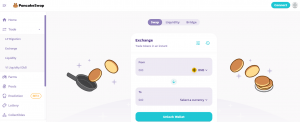
The final culinary swap on this list, PancakeSwap has the most fun vibe out of any exchange on this list. On the home page, you are peppered with options like farming, staking, and lottery among the backdrop of sparkles and pancakes.
The design is cute and quirky, with their logo being what seems to be a living pancake with ears. Many of the pages use the pan that flips seven pancakes perfectly onto a plate, perhaps giving you a metaphor for a perfect swap. It definitely makes you feel more at ease with its design.
Though USD 10 million the DEX received from Binance to get started might put decentralization purists on edge, PancakeSwap’s developers are also all anonymous, which might make you wary or give you flashbacks of Satoshi. In any case, it is audited by Certik, so the protocol has been checked out by a third party. PancakeSwap also operates on similar liquidity pool protocols as the other [insert food here]Swap exchanges.
With PancakeSwap V2 having the success that the creators envisioned, PancakeSwap should continue to attract those who are looking for a great exchange under the backdrop.
6. JustSwap

From unicorns and pancakes, here we take a turn for the serious. And for those who are less susceptible to magical creatures or food, this might be your swap of choice. JustSwap is powered by the TRON blockchain and uses TRC-20 tokens to make DeFi swaps. You can swap out TRC-20 tokens for other token pairings on the TRON blockchain.
Like its unicorn cousin and culinary counterparts, JustSwap makes it simple to swap tokens. However, unlike the other applications, JustSwap isn’t as feature-heavy. Since the protocol is new, it doesn’t have the staking or rewards features as some of the other decentralized applications have. JustSwap is still the main exchange you can use your TRC-20 tokens, which for some people is a convenient option. The TRON blockchain, for now, is faster and cheaper than the Ethereum blockchain, making trades a lot more convenient for many.
So if you have a bunch of coins on the TRC-20 network or just want to see what it is like trading on a platform that isn’t Ethereum-based, JustSwap could have what you’re looking for.
7. Bisq
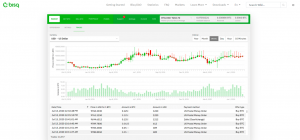
Bisq prides itself in being a decentralized autonomous organization (DAO). A decentralized autonomous organization runs on computerized rules. Those rules are not run by a company with a board of directors or a nonprofit, as even nonprofits are centralized entities. Bisq is only software, and the rules are governed by software.
The platform lets you buy bitcoin (BTC), litecoin (LTC), ether (ETH) with all kinds of fiat like Australian Dollar (AUD), United States Dollar (USD), euro (EU), and much more. Bisq doesn’t command the wealth that other decentralized exchanges on here command, but it is on this list for being able to trade Bitcoin and other altcoins with fiat in a private and secure manner that bolsters the values of decentralization.
Although fairly easy to use and the design is very clean, it could be a bit harder to get used to. For one, you have actually to download the program. It doesn’t just show up on your browser with a search. But after that, it isn’t difficult to jump right in. Bisq offers a ton of videos for you to learn in case you’re stuck.
If this were a list on keeping up with decentralization values, privacy, and trustworthiness, Bisq would be on top of the list. It’s certainly one to consider if you want to trade Bitcoin while keeping the ethos of decentralization in mind.
8. OpenOcean
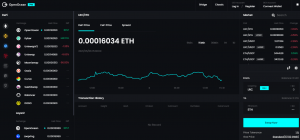
OpenOcean makes it on this list as a DEX aggregator. It compiles several decentralized exchanges, even ones that are on this list like SushiSwap and Uniswap, and attempts to give you the best price of your chosen crypto from many decentralized applications. They’ve managed to win over customers with their ‘no extra fees’ policy, not charging for protocol fees and even protecting users if the prices of assets spike up or down. The PRO version allows the usual trading tools like candlestick charts, profit and loss settings, limit orders, and more.
If you have a specific token that you are looking for and want to see which decentralized exchange is giving the best offer, Open Ocean could be your platform of choice. If you’re looking for a pure decentralized exchange, however, OpenOcean aggregating centralized exchanges might not sit well with you.
9. 1inch Exchange
1inch is the other DEX aggregator on this list. The DEX uses liquidity protocols that facilitate trade and bases its protocol on algorithms. If you’re worried that an Oasis coin might have a lower price than a Uniswap one, you can ease your worry with a DEX aggregator like 1inch. The platform also operates on the Ethereum and Binance Smart Chain, allowing diversification in your trading options.
With the governance token having just launched in December 2020, 1inch looks to make waves as a part of the DeFi ecosystem.
10. HoneySwap
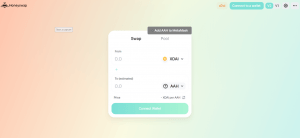
Honeyswap is like Uniswap except restructured around xDai trading pairs. With barely any decentralized exchanges offering xDai, this could be what you’re looking for if you have developed a liking for the stablecoin. The exchange offers yield farming, a way to transfer ERC-20 tokens to the xDai network, and allows you to exchange your fiat for xDai.
Honeyswap doesn’t want to stop by just being a Uniswap clone. It is looking to, if it isn’t already, be a large part of the decentralized finance ecosystem.
